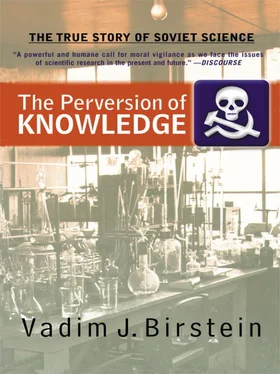315. Kovner, M. A., “Moi repressirovannye uchitelya” [My repressed teachers], Voprosy Istorii Estestvoznaniya i Tekhniki 4 (1997): 113 (in Russian).
316. Manevich, “Takie byli vremena,” pt. 2.
317. Kaftanov, S., “V podderzhku michurinskoi biologii v vysshei shkole” [In support of Michurin’s biological theory in higher institutions of learning], Izvestya , September 8, 1948 (in Russian); translation in Zirkle, Death of a Science , pp. 294–300.
318. One of Timofeev-Ressovsky’s pupils, Nikolai Vorontsov (1934–2000) was a zoologist, geneticist, and evolutionist, the author of more than 550 scientific publications, a foreign member of the Swedish and American National Academies of Sciences. In 1989, he was appointed minister of the newly created USSR Nature Protection Ministry, which was disbanded after the fall of the USSR in 1991. Later, Vorontsov participated in several international actions of Greenpeace. Until his death in 2000, he headed a laboratory at the Koltsov Institute of Developmental Biology in Moscow. I was on the staff of this laboratory in 1984 and from 1990 to 1998.
319. Vorontsov, N. N., “Current State of Evolutionary Theory in the USSR,” in Leonard Warren and Hilary Koprovski, eds., New Perspectives of Evolution (New York: John Wiley and Sons, 1991), pp. 65–75.
320. Makhotin, A. A., “Ivan Ivanovich Schmalhausen (1884–1963),” Zoologicheskii Zhurnal 58 (2) (1964): 297–302 (in Russian).
321. Polyansky, Gody prozhitye , p. 136.
322. The English translation: Schmalhausen, Ivan I., The Origin of Terrestrial Vertebrates , trans. L. Kelso (New York: Academic Press, 1968).
323. Nasimovich, A. A., “Pamyati Aleksandra Nikolaevicha Formozova” [In memory of Aleksandr Nikolaevich Formozov], Bulletin Moskovskogo Obshchestva Ispytatelei Prirody, Otedelenie Biologicheskoe 80 (1) (1975): 5–18 (in Russian).
324. Medvedev, The Rise and Fall , pp. 126–127; Trubetskova, “Nauchnaya i pedagogicheskaya deyatelnost’.”
325. Lysenko, The Situation in Biological Science , pp. 602–603.
326. Kremenetsov, Stalinist Science , p. 304; Kolchinsky, V poiskakh , p. 56.
327. Soyfer, Lysenko , pp. 122–123; Kolchinsky, V poiskakh , pp. 58–59, 178–180.
328. Ryzhkova, E. V., “Akademik Isai Izrailevich Prezent,” Vestnik Leningradskogo Gosudarstvennogo Universiteta 10 (1948): 98–101 (in Russian).
329. Kolchinsky, V poiskakh , p. 202.
330. Medvedev, The Rise and Fall , pp. 10–11; Weiner, Douglas R., Models of Nature: Ecology, Conservation, and Cultural Revolution in Soviet Russia (Bloomington: Indiana University Press, 1988), pp. 124, 132–133, 270; Soyfer, Lysenko , pp. 62–63.
331. Soyfer, Lysenko , p. 63.
332. Kolchinsky, V poiskakh , pp. 204–205.
333. Nechaeva, N. T., and V. V. Stanchinsky, Jr., “Pervyi ekolog strany” [The first Russian ecologist], Priroda 12 (1991): 90–95 (in Russian). This reserve was organized in 1898 by Fridrich Fal’ts-Fein on his estate (Weiner, Models of Nature , p. 17).
334. For details of Vladimir Stanchinsky’s biography, see Weiner, Models of Nature , pp. 79–82; Nechaeva, N. T., and V. S. Shishkin, “V poiskakh estestvennykh system (nauchnoe nasledie V. V. Stanchinskogo” [In the search of natural systems (the scientific heritage of V. V. Stanchinsky)], Voprosy Istorii Estestvoznaniya i Tekhniki 2 (1994): 87–97 (in Russian).
335. Nechaeva and Shishkin, “Pervyi ekolog strany.”
336. Kolchinsky, V poiskakh , pp. 205–206.
337. Joravsky, The Lysenko Affair , pp. 92–93, 238–240.
338. Soyfer, Lysenko , p. 64.
339. Joravsky, The Lysenko Affair , p. 120. According to the scholar Valery Soyfer, in 1937 Prezent was arrested for seducing a minor. After the intervention of Lysenko, Prezent was released and continued his attacks on the hated “Mendelists-Morganists,” including Professor Koltsov and Academician Vavilov (Soyfer, Lysenko , p. 64).
340. Ginetsinskaya, T. A., “Biofak Leningradskogo Universiteta posle sessii VASKhNIL” [The biology faculty of Leningrad University after the VASKhNIL session], in Yaroshevskii, Repressirovannaya Nauka , pp. 114–125.
341. Schnol, Geroi i zlodei , p. 321.
342. This is not a rumor. One of my father’s pupils, M. V., currently academician and director of a big institute within the academy, told me that he accompanied his female classmates to Prezent’s apartment several times.
343. Schnol, Geroi i zlodei , p. 255.
344. Kostyrchenko, Out of the Red Shadows , pp. 250–251. Only the name of the archive (Russian Center for the Preservation and Study of Documents of Modern History) but not the code of the document is given.
345. Ibid., pp. 250–251.
346. The Moscow Scientists Club (Dom Uchenykh) was organized in June 1920 [Savina, G. A., “Napisano v podvalakh OGPU” [It was written in the OGPU basement], Vestnik Rossiiskoi Akademii Nauk 65 (5) (1995): 452–460 (in Russian)].
347. Soyfer, Lysenko , p. 332.
348. Kalinnikova, V. D., “Tsitolog Grigorii Iosifovich Roskin” [The cytologist Grigory Iosifovich Roskin], Priroda 8 (1994: pp. 62–74 (in Russian).
349. Miller, S. L., J. W. Schopf, and A. Lazcano, “Oparin’s Origin of Life : Sixty years later,” Journal of Molecular Evolution 44 (1997): 351–353. See details in Graham, Science, Philosophy, and Human Behavior , pp. 70–96.
350. Oparin, Aleksandr Ivanovich, in Turkevich, Soviet Men of Science , pp. 275–276.
351. Aleksandrov, Trudnye gody , pp. 125–128.
352. Gaisinovich, A. E., and E. B. Muzrukova, “‘Otryzhka’ kletochnoi teorii” [“The belching” of the cell theory], Priroda 11 (1989): 92–100 (in Russian).
353. Rapoport, Ya., “Nedolgaya zhizn’ ‘zhivogo veshchestva’” [The short life of a “living substance”], in Glinka, M. S., ed., Sovremennye mysli, ili proroki v svoem otechestve [Well-Timed Thoughts, or Prophets in Their Own Fatherland] (Leningrad: Lenizdat, 1989), p. 130 (in Russian).
354. Cited in Gaisinovich and Muzrukova, “‘Otryzhka’ kletochnoi teorii,” p. 98.
355. Rapoport, “Nedolgaya zhizn’‘zhivogo veshchestva,’” p. 139.
356. Details in Soyfer, Lysenko , pp. 216–218.
357. Oparin, A. I., “Otchet Biologicheskogo otdeleniya AN SSSR” [The report of the Biology Division of the USSR Academy], Izvestiya Akademii Nauk SSSR, Seriya Biologicheskaya 3 (1955): 3 (in Russian).
358. Aleksandrov, Trudnye gody , pp. 165–169. It is amazing that Dmitrii Lebedevand Yurii Olenov were Party members.
359. Bogorov, V. G., “Lev Aleksandrovich Zenkevich (1889–1970)” [L. A. Zenkevich (1889–1970)], Bulletin Moskovskogo Obshchestva Ispytatelei Prirody, Otdelenie Biologicheskoe 76 (3) (1971): 9–12 (in Russian).
360. Zenkevich, L. A., and J. A. Birstein, “O vozmozhnykh meropriyatiyakh po povysheniyu proizvoditel’nykh svoistv Kaspiya i Arala” [On possible measures for enhancing the productivity of the Caspian and Aral seas], Rybnoe Khozyaistvo 3 (1934): 38–40 (in Russian).
361. Zenkevich, L. A., J. A. Birstein, and A. F. Karpevich, “Pervye uspekhi rekonstruktsii fauny Kaspiiskogo morya” [First steps in reconstruction of the Caspian Sea fauna], Zoologicheskii Zhurnal 24 (1) (1945): 31 (in Russian).
362. According to the rumors, the university rector at the time, Academician Aleksandr Nesmeyanov (rector in 1948–1951), was against the arrest.
Читать дальше











